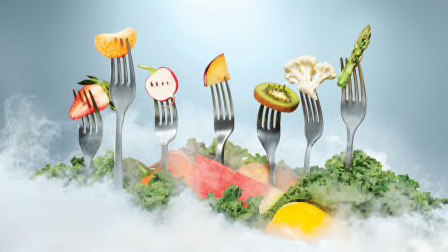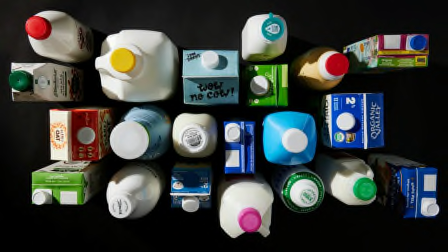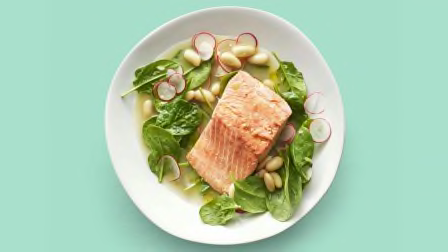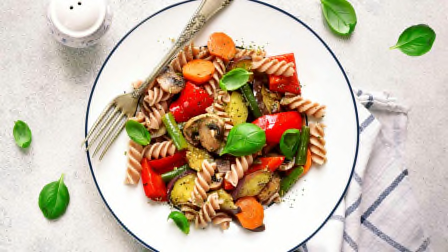5 Anti-Aging Diet Moves
Bloated? Balance problems? Try these easy diet fixes for common health concerns.
You already know that a healthy diet is the key to a healthy body and that it can help you ward off diseases such as high blood pressure and type 2 diabetes. But you might not realize all the other surprising ways food can feed your health. You can use your diet to help remedy numerous conditions (many of which become more common with age)—such as wobbly balance and low mood.
Winter Blues
Food fix: Replace refined carbs with whole grains, and increase vitamin D intake.
When the weather turns cold and days get shorter, we often turn to comfort foods to help us feel better. The problem is, the foods we reach for tend to be made mostly of refined carbohydrates, sugar, and fat. That combination may leave us feeling tired and cranky.
Bloating After Meals
Food fix: Feed your digestive system fiber and fluids so that it runs smoothly.
If you routinely feel bloated after a meal, your body may be trying to tell you something. “Constipation and bowel irregularity are one of the biggest causes of bloating,” says Chaya Lee Charles, RDN, assistant teaching professor at the David B. Falk College of Sport and Human Dynamics at Syracuse University in New York. “Increasing your fiber intake can help keep your digestive tract moving regularly.” Fruits, vegetables, whole grains, beans, nuts, and seeds are all good sources. Older men should aim for at least 28 grams of fiber per day; women, at least 22 grams.
When you eat more fiber, it’s important to make sure you also drink more water (or other noncaffeinated, nonalcoholic beverages). “You may actually feel more bloated if you increase your fiber without increasing fluid intake,” Charles says.
And be sure to eat slowly and chew your food thoroughly. Gulping food can make you swallow more air—and lead to gas and bloating. Eating slowly also helps prevent overeating by giving your brain time to recognize that you’re full.
Unsteady Balance
Food fix: Make sure you’re eating enough healthy protein.
There are several reasons your balance may get worse as you age, but one common cause is sarcopenia (age-related muscle loss). Help your muscles stay strong by getting enough protein.
“The proteins in your muscles are constantly being broken down,” says Roger Fielding, PhD, associate director of the Jean Mayer USDA Human Nutrition Research Center on Aging at Tufts University in Boston. “If you aren’t consuming enough protein in your diet, the breakdown exceeds synthesis and you have a loss of muscle mass.” And without strong muscles to support your joints, your balance may suffer, leaving you at greater risk of falling.
On average, older adults should aim for at least 0.6 gram of protein per pound of body weight per day—about 90 grams for someone who weighs 150 pounds. Make sure to spread it evenly among meals. “Many older adults skip protein in the morning, but it’s important to deliver protein to your muscles throughout the day,” Fielding says. And be sure to get a mix of animal (lean meats, fish, dairy) and plant (beans, nuts, soy) sources. Plant foods also contain antioxidants and polyphenols that can help reduce inflammation. “Increases in inflammatory compounds can have potent effects on muscle loss,” Fielding says. In one study in The Journal of Nutrition, older men and women with adequate blood levels of antioxidant vitamin C had an average of 1.6 percent and 3.4 percent greater muscle mass, respectively, than those with lower levels.
Protect Hearing
Food fix: Eat more plant-based foods.
Eating lots of high-quality plant foods and low amounts of animal-based foods, refined grains, added sugars, and unhealthy fats is good for your heart. What does that have to do with your ears? Just as is the case for the rest of your body, adequate blood flow is important for proper ear function. A plant-based diet can help enhance this by improving cholesterol and lowering blood pressure. It also helps to protect against oxidative damage and to reduce inflammation. “I tell all my patients with hearing loss to follow a heart-healthy diet,” says Erika Woodson, MD, an otolaryngologist at the Cleveland Clinic. “If it’s good for your heart, it’s going to be good for your ears as well.”
More than specific foods, though, what seems to matter most is following a healthy eating plan. In one 2018 study involving more than 81,000 women, those whose diets most closely matched one of three heart-healthy eating patterns—alternate Mediterranean, Dietary Approaches to Stop Hypertension (DASH), and 2010 Alternative Healthy Eating Index—had a 30 percent lower risk of developing hearing loss over the 22-year study period.
To make it easy, at each meal fill half your plate with fruits and veggies (but limit starchy ones, such as potatoes). The other half should be made up of whole grains and plant-based protein, such as tofu, lentils, or nuts, most days, with modest amounts of fish, lean meat, and poultry less often.
Vaginal Infections
Food fix: Try adding probiotic-packed foods to your diet.
As women age, hormonal changes—especially a decrease in estrogen—can lead to vaginal dryness. “The superficial cells that line the vagina lose glycogen, which is what’s needed to nourish the good bacteria in your vagina,” says Mary Jane Minkin, MD, director of the Sexual Intimacy & Menopause Program for cancer survivors at Yale’s Smilow Cancer Center in New Haven, Conn. “This can lead to an increase in nastier bacteria colonizing the vagina, causing not only vaginitis but also raising your risk of getting a urinary tract infection.”
Research is mixed on whether consuming probiotics can help prevent vaginal infections, one reason to skip supplements and rely on food instead. For instance, Lactobacillus is the main probiotic that keeps the vagina healthy, but there are many different strains. By eating probiotic-rich foods such as yogurt, sauerkraut, kefir, and tempeh, you get a variety of different Lactobacillus strains and other natural probiotics.
Editor’s Note: A version of this article also appeared in the December 2020 issue of Consumer Reports On Health.

















